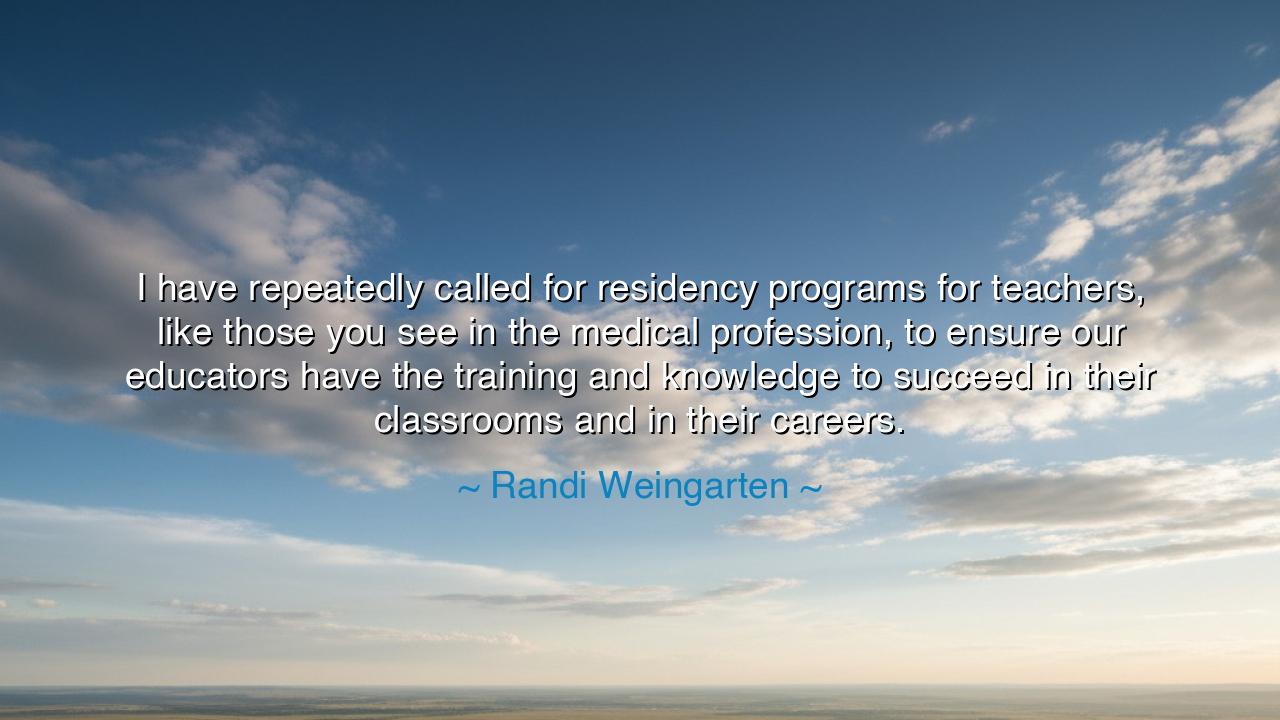
I have repeatedly called for residency programs for teachers
I have repeatedly called for residency programs for teachers, like those you see in the medical profession, to ensure our educators have the training and knowledge to succeed in their classrooms and in their careers.






Hear the words of Randi Weingarten, champion of education and advocate for teachers, who declares with vision: “I have repeatedly called for residency programs for teachers, like those you see in the medical profession, to ensure our educators have the training and knowledge to succeed in their classrooms and in their careers.” In this proclamation lies a powerful truth: that the task of shaping minds is as vital and sacred as the task of healing bodies, and that those entrusted with this calling deserve preparation equal in rigor and respect to that of the physician.
The origin of this wisdom comes from the practice of the medical residency, where students of medicine, having learned in books and lecture halls, step into the hospital wards under the guidance of seasoned mentors. There, through long nights, countless patients, and the slow sharpening of skill, the healer is formed. Weingarten asks: why should the teacher, who holds in her hands the shaping of souls and the awakening of futures, not be trained with equal devotion? For teaching, too, demands more than knowledge—it demands practice, mentorship, and the endurance born of experience.
The ancients knew this well. In the academies of Greece, the student did not simply study the words of Plato or Aristotle; he lived among them, learned through dialogue, correction, and example. Apprenticeship was the sacred path: the craftsman took the novice by the hand, guiding him until his own hands could work with mastery. So too must we see teaching: not as a profession that begins with a diploma, but as an art that must be honed through years of guided practice, side by side with a master in the classroom.
Consider the story of Maria Montessori, who began her journey as a physician, trained in the discipline of medicine. Yet when she turned her eye toward children and education, she carried with her the rigor of medical practice. She observed, she experimented, she refined her methods with the precision of a scientist. Her legacy transformed classrooms around the world, proving Weingarten’s truth: that when education borrows the discipline and structure of medicine, it creates systems of enduring success.
The meaning of Weingarten’s words is deeply motivational. She elevates the work of teachers to its rightful place alongside doctors and healers. She reminds us that education is a form of healing, not of the body, but of the spirit and the mind. And just as a careless hand in surgery can wound, so can an unprepared teacher dim the flame of curiosity in a child. To prepare teachers with residencies is to honor both the profession and the children whose futures depend upon it.
The lesson for us is clear: we must never treat teaching as a profession that one enters lightly, armed only with theory. We must build pathways of mentorship, practice, and discipline, ensuring that every educator enters the classroom not as a novice abandoned to trial and error, but as a professional tempered by guidance and training. In doing so, we raise not only the status of teachers, but the potential of generations.
Practical action flows from this wisdom. Support programs that pair new teachers with master educators. Advocate for policies that invest in teacher residencies, just as we invest in medical training. And as individuals, honor the labor of teachers, encouraging them, respecting them, and remembering that their task is nothing less than the shaping of the world to come.
Thus, Weingarten’s words resound like a clarion call. They remind us that teachers and physicians are alike in their sacred duty: one heals the body, the other shapes the mind. Let us treat both with equal reverence, preparing them with the depth, the patience, and the practice their calling demands. For in doing so, we secure not only the health of the present, but the wisdom of the future.






AAdministratorAdministrator
Welcome, honored guests. Please leave a comment, we will respond soon